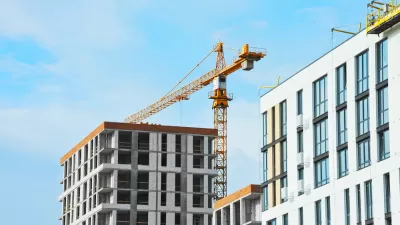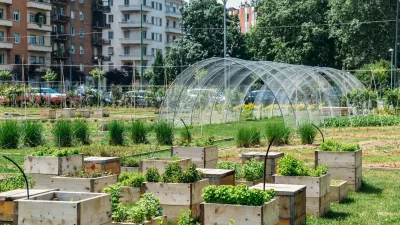Planning student Jennie Moore is going a step beyond the 'ecological footprint' model, and is researching what she calls the 'one-planet city'.
"...Jennie starts with the premise that the city, currently conceived as an isolated unit of human population, is inherently unsustainable. She says:
Cities are basically concentrated hubs of trade and consumption. From a thermodynamics and complex systems theory standpoint, cities are dissipative structures – they consume materials and energy and produce waste. They're dependent on surrounding ecosystems; they can't function within their own geographical boundaries. However, cities are also hubs of organizational capacity. So my research asks at what scale, at what point does a city exceed its share of global ecological carrying capacity and how could that impact be reduced?
Her investigation into the notion of a one planet city is informed in part by "One Planet Living Communities" such as BedZED (Beddington Zero Energy Development), an eco-village in the UK. But unlike these new, "clean slate" communities that are constructed to be models of ecological sustainability, Jennie Moore's one planet city concept deals with the more challenging fabric of existing cities – specifically those in the developed world, i.e. North America, Europe, Japan, etc. North American cities, for example, generally have ecological footprints so high that if everyone were to live like the average citizen of these cities, 4 or 5 planets would be required to sustain their levels of consumption and waste production."
FULL STORY: Conceptualizing the One Planet City

Americans May Be Stuck — But Why?
Americans are moving a lot less than they once did, and that is a problem. While Yoni Applebaum, in his highly-publicized article Stuck, gets the reasons badly wrong, it's still important to ask: why are we moving so much less than before?

Using Old Oil and Gas Wells for Green Energy Storage
Penn State researchers have found that repurposing abandoned oil and gas wells for geothermal-assisted compressed-air energy storage can boost efficiency, reduce environmental risks, and support clean energy and job transitions.

Placekeeping: Setting a New Precedent for City Planners
How a preservation-based approach to redevelopment and urban design can prevent displacement and honor legacy communities.

Idaho Data: Unexpected Vehicle Repairs Exacerbate Housing Instability, Eviction Risk
Over 21 percent of clients struggle with transportation barriers.

A Year-Long Investigation On Permanent Supportive Housing
The New York Times reveals what’s working and what’s not in the cornerstone of Housing First.

Survey: US Public Spaces Not Meeting Community Needs
A lack of funding prevents many U.S. parks and public spaces from playing a more significant role in helping residents meet daily needs.
Urban Design for Planners 1: Software Tools
This six-course series explores essential urban design concepts using open source software and equips planners with the tools they need to participate fully in the urban design process.
Planning for Universal Design
Learn the tools for implementing Universal Design in planning regulations.
Heyer Gruel & Associates PA
City of Moreno Valley
Institute for Housing and Urban Development Studies (IHS)
City of Grandview
Harvard GSD Executive Education
Salt Lake City
NYU Wagner Graduate School of Public Service
City of Cambridge, Maryland





























